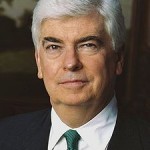MPAA’s Dodd: ‘Silicon Valley and Hollywood making progress’
February 18, 2013
By Colin Mann
 MPAA Chairman and CEO Chris Dodd has continued his advocacy of the need to strike a balance between the desire for a free and open Internet and the protection of intellectual property, with co-operation between Silicon Valley and Hollywood central to this process.
MPAA Chairman and CEO Chris Dodd has continued his advocacy of the need to strike a balance between the desire for a free and open Internet and the protection of intellectual property, with co-operation between Silicon Valley and Hollywood central to this process.
Delivering a keynote speech at the National Press Club Speakers Luncheon, Dodd provided an overview of the many successes and key challenges currently facing the film and television industry. He highlighted the innovation and creativity that is changing film-making and content delivery around the world and discussed the critical importance of a vibrant entertainment industry to a healthy economy.
Dodd underscored the important impact that the film and television industry has on the American economy. “Every work day, more than 2.1 million of our fellow citizens go to work at a job that either directly or indirectly that depends on movies and TV,” Dodd said. “These jobs involve producing, marketing, manufacturing, and distributing movies and TV shows and related movie and TV businesses – nearly 700,000 direct jobs in all. Many of them are part of a network of 95,000 small businesses located all across this country. And let me add, the film and television industry does more than simply create jobs – it creates careers. And many of these careers do not require a college degree or advanced education. A high school diploma and several years of technical training and you are off and running in the movie and TV business, earning a good living—one that pays on average more than $62,000 a year.”
He said it had “never been a better time” to be a consumer of movies and TV. “Because movies matter – to more people, in more places, who want to watch them at more times, across multiple platforms -the film and television I ndustry is continuously innovating to meet that demand.
Today movies and TV shows can be viewed in theatres, on the big screen, or at home on TV screens, laptops, iPads, Kindles and smart phones.” Nothing that there were more than 375 unique licensed online distribution services around the world that provide high-quality, on demand film and television shows, offering the easiest, fastest, safest, highest quality product and viewing experience possible, he said that the next time someone suggests the film and television industry is not innovating fast enough to satisfy consumer demand, “remind them of those innovations”.
He said that this was why it was so crucial that to protect this content from theft. “Because consumers deserve to enjoy first-generation versions of their favourite films – not second-hand, pirated films-of-films shot and recorded inside a movie theatre on a mobile phone,” he stated.
“We must strike a balance between the desire for a free and open Internet and the protection of intellectual property. The future cannot be about choosing one over the other – between protecting free speech OR protecting intellectual property- it must be about protecting both,” he declared.
“We can and must have an Internet that works for everyone, and protection for the creative industry’s genius that intellectual property represents,” said Dodd. “There should be no confusion. For the more than two million Americans whose jobs depend on the motion picture and television industry ‘free and open’ cannot be synonymous with ‘working for free’.”
He said that to protect IP, and the openness and freedom of the Internet, “we must together innovate our way through these challenges. Fortunately, Silicon Valley and Hollywood are making some progress on this front,” he noted.
